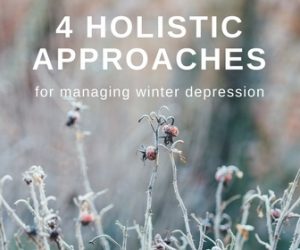Four Holistic Approaches for Seasonal Affective Disorder

I grew up hearing about the “winter blues” but nowadays we know that for some people the change in seasons can bring about significant negative mental health issues that make it difficult to engage in life the way they do during the rest of the year.
What is SAD?
Formerly diagnosed as Seasonal Affective Disorder, SAD has been renamed in the new Diagnostic and Statistical Manual (DSM V) as Depressive Disorder with seasonal pattern. What this means is that a change in season causes symptoms that align with those of depression. Depression with seasonal pattern can be quite challenging in that there is nothing that individuals can do to control the weather or stop the change in seasons but there are some ways that people can take control of their experience by knowing the symptoms and planning ahead for seasonal changes.
Signs you might have Seasonal depression
If you notice that with the change of the season, you experience the following symptoms, it may be a sign that you suffer from Depression with seasonal pattern:
* lack of motivation
* lack of enjoyment in pleasurable activities
* changes in appetite
* changes in sleep
* fatigue and changes in energy
* persistent sad or hopeless feelings
Paying attention to the last two years of mood, thought and behavioral changes with season correlation can be a helpful clue to knowing if you may be suffering from this disorder.
If moving to a place where the weather is more consistent or planning a vacation that lasts a season is not an option, there are holistic approaches to managing the symptoms that you may experience as the seasons change.
Four Holistic Approaches
Aromatherapy
The sense of smell is unique in that it is the one sense that bypasses our frontal cortex and heads straight into the area of our brains where memory and emotions reign. In aromatherapy, essential oils that are derived from plants and flowers are used to encourage the body and the mind to feel more energized, focused, mentally clear, and invite us to recall positive memories that the depressed brain may have difficulty conjuring up with cognition alone. Essential Oils can be used in inhalers, skin and hair products, creams and salves. Working with a knowledgeable practitioner who can determine the best use of essential oils for your specific needs can make a positive difference in how you experience symptoms during the seasons.
Exercise
Most of us can list the benefits of exercise but know how hard it can be to maintain an exercise routine when the roads are icy and motivation is low. Participating in exercise such as yoga can be an incredible way to keep the routine and encourage mindfulness. Making yoga a routine during the week either at home or with others reinforces mindfulness practices while giving your brain a boost with depression fighting hormones.
Supplements & Light Box Therapy
When the sun is hiding behind dark skies, it’s even harder for our bodies to get some of the vitamins it needs to feel energized and vital. Supplements like Vitamin D and B12 can make a positive difference in decreasing feelings of fatigue during the darker months. Other supplements that support positive mood like Saint John’s Wort and SAM-E can be used to help alleviate depressed mood without the need for a doctor’s prescription. Light box therapy can also be helpful in helping your brain activate Supplements should always be used with the same care as any medication and it is recommended that you speak to your physician before beginning any supplement or using a light box.
Mindfulness and Meditation
Mindfulness and meditation have been known to decrease symptoms of depression by allowing us to get detach from distressing thoughts that may be more prevalent while in a depressive state. With ongoing practice, a meditation practice can improve overall mood and decrease depression and anxiety regardless of the season. There are numerous apps and community spaces that promote mindfulness and meditation practices which also allows you to connect with others and decrease feelings of isolation.
There is no one right solution so it might be important to try different combinations of interventions and find what works best for you during the difficult season. Keeping a journal or using a health app to track how you’re feeling can be helpful in determining what types of interventions might work best for you. Know that you do not have to battle seasonal depression alone; working with a professional can provide you with valuable insight and help you plan for the season so that you can be your best self, year-round.
© Copyright 2017 FreshPathNY.com. All rights reserved. Contributed by Deanna Richards, LMHC
